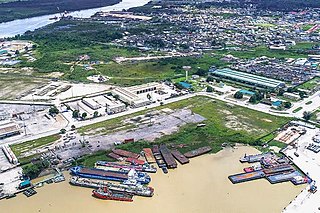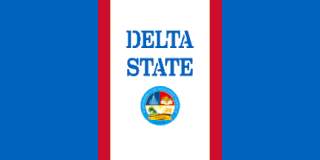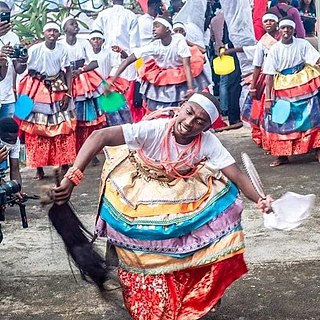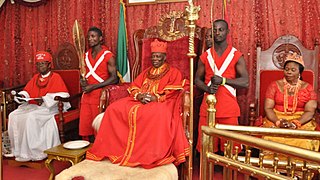Related Research Articles

The city of Warri is an oil hub within South-South Nigeria and houses an annex of the Delta State Government House. Warri City is one of the major hubs of the petroleum industry in Nigeria. Warri and her twin city, Uvwie are the commercial capital of Delta State with a population of over 311,970 people in 2006. The city is the indigenous territory of Urhobo, Itsekiri and Ijaw people.

Delta State is a state in the South-South geopolitical zone of Nigeria. Named after the Niger Delta—a large part of which is in the state—the state was formed from the former Bendel State on August 27, 1991. Bordered on the north by Edo State, the east by Anambra and Rivers States, and the south by Bayelsa State across the Niger River for 17 km and the Forçados River for 198 km, while to the west is the Bight of Benin which covers about 160 kilometres of the state's coastline. The State was initially created with 12 local government areas in 1991 which was later extended to 19 and now has 25 local government areas. Asaba as its state capital is located along the River Niger on the northeastern end of the State, while the state's economic centre is the twin cities of Warri and Uvwie.

The Itsekiri are one of the Yoruboid subgroup of Nigeria's Niger Delta area, They speak a Yoruboid language and can be found in Delta State. The Itsekiris presently number 2.7 million people and live mainly in the Warri South, Warri North and Warri South West local government districts of Delta State on the Atlantic coast of Nigeria. Significant communities of Itsekiris can be found in parts of Edo and Ondo states and in various other Nigerian cities including Lagos, Benin City, Port Harcourt and Abuja. Many people of Itsekiri descent also reside in the United Kingdom, the United States and Canada. The Itsekiris are closely related to the Yoruba of South Western Nigeria and also close to the Okpe people and Edo peoples. The Itsekiris traditionally refer to their land as the Kingdom of Warri or 'Iwere' as its proper name – which is geographically contiguous to the area covered by the three Warri local government districts. The area is a key centre of Nigeria's crude oil and natural gas production and petroleum refining and the main town Warri forms the industrial and commercial nucleus of the Delta State region.
Agbassa is the name of one of the two Urhobo kingdoms in Warri South Local Government, Delta State, Nigeria, the other being Okere-Urhobo. The name 'Agbassa' is of British origin derives from its original name 'AGBARHA', which is still in use. The current king is H.R.M Orhifi Ememoh II,.

Okpe is a kingdom in Delta State, Nigeria. Today, it is also the name of a local government area. It is one of the many kingdoms that make up Urhobo nation. Its capital is Orerokpe. The kingdom plays host to the Osubi Airport, which is actually located at Osubi and the Delta State Trade Fair Complex. The Orodje celebrated ten years on ancestral throne. Major General Felix Mujakperuo is the king of Okpe Kingdom. The kingship is usually rotated between the four ruling houses.

Uvwie (/hu-we-ɛ/), is a principal Urban Local Government Area in Delta State. It lies along the Warri River and it is one of the twenty-four Urhobo Kingdoms. The entirety of the LGA is conurbated with the city of Warri, making it a greater part of Warri metropolitan area
Effurun is a town and the headquarters of Uvwie Local Government Area in Delta State, Nigeria. It is an Urban center, densely populated with different infrastructural development. it borders it's twin city Warri, also serves as an entrance to Warri.
The Warri Crisis was a series of conflicts in Delta State, Nigeria between 1997 and 2003 between the Itsekiri, the Ijaw, and the Urhobo ethnic groups. Over 200,000 people were displaced by the Warri conflict between 1999 and 2006. Over 700,000 people were displaced during this period by violence in Delta State overall.
Ovu is a town in Southern Nigeria in Delta State and part of Agbon Kingdom and His Royal Majesty, Ogurime-Rime Ukori I is the current King and Ovie of Agbon Kingdom.
Warri South is a Local Government Area of Delta State, Nigeria. Its headquarters is in the city of Warri.
The Itsekiri language is a major branch of the Yoruboid group of languages, which as a group, is a key member of the Volta–Niger sub-family of the Niger–Congo family of African languages. Itsekiri is spoken by nearly 900,000 people in Nigeria as a first language and by many others as an additional language notably in the Niger Delta and in parts of Edo and Ondo states of Nigeria. The other key members of the Yoruboid group are Yoruba and Igala along with the various Yoruba dialects spoken in Benin and Togo.
The Urhobos are people located in southern Nigeria, near the northwestern Niger Delta.

The Kingdom of Warri, Warri Kingdom or Iwere Kingdom, was established in 1480, was part of the Nigerian traditional states its ancestral capital is based in Ode-Itsekiri, Warri South LGA, Delta State, Nigeria with a palace erected in 1950s in the multi-ethnic city of Warri, Warri South LGA, Delta State, Nigeria.
According to the language family tree classification by Ethnologue, Okpe, Urhobo and Uvwie, alongside Eruwa and Isoko, make up the five Southwestern Edoid languages of the Benue-Congo group. Quoting Johnstone (1993), Ethnologue puts the population of Urhobo people at 546,000, Okpe 25,400 (2000) and Uvwie 19,800 (2000). These three languages have geographically neighbouring languages: Izon and Itsekiri to the west and south, Ukwuani and Isoko to the east and Edo to the north. Thus, Isoko and Urhobo are similar languages that belong to the same linguistic family.
M. G. Ejaife was an Urhobo nationalist from Okpara Inland and the first principal of the premier Urhobo College Effurun,Uvwie. He was one of two recipients of scholarship awards from Urhobo Progress Union during World War II years. He returned to Nigeria after his graduation with a B.A. degree of Durham University in 1948, thus becoming the first Urhobo graduate. He then became the founding Principal of Urhobo College, Effurun. He brought that famous secondary school to its great heights in many fields. Mr. Ejaife later served in many other capacities in Urhobo affairs. He was Urhobo's first Senator, serving with distinction in Nigeria's Upper Chamber during the country's First Republic.
Dr Tidi Michael Ejueyitsi is the 15th and current local government chairman of Warri south local government area, Delta State Nigeria. He was born to Joshua Oritsetimeyin Tidi and late Princess Roli Lizzy Emiko. Tidi Michael was elected on the platform of the Peoples Democratic Party in Delta State, Nigeria.

Olu Ginuwa was an Itsekiri king who was the first Olu of Warri. He was the eldest son of Oba Olua, the 14th Oba of Benin (1473–1480A.D.) and Heir Apparent to the throne of the Great Benin Kingdom. He migrated from Benin Kingdom and was crowned the first Olu of Warri. He reigned for a period of 30 years. He reigned from 1480 to 1510. He was succeeded by his son, Olu Ijijen (Ogbowuru). Another of his sons, Olu Irame took over as king after Olu Ijijen joined his ancestors.

Olu Irame was the 3rd Olu of Warri. He was the second son to Olu Ginuwa and succeeded his brother Olu Ogbowuru (Ijijen) as the 3rd Olu of Warri. It is stated that he banished the three gods and their worshipers from Ode-Itsekiri-Olu because of their incessant ''noise-making". The gods and their worshipers moved to Orugbo which is a community about 2 miles from Ode-Itsekiri-olu.

Olu Ginuwa II was a Nigerian traditional title holder and paramount leader of the Itsekiri who was Olu of Warri from 1936 to 1949. He was the 17th Olu of Warri Kingdom with the title Ogiame Ginuwa II. He was born Emiko Ikengbuwa. He succeeded his grandfather Olu Akengbuwa as Olu of Warri after an interregnum that lasted 88 years when Warri's political leadership was dominated by merchant princes.
Wado City is the proposed name of the urban, commercial and industrial Urhobo territories in Warri City in Delta State, Nigeria. It shares boundaries with Warri North and Warri South West.
References
- ↑ Omonigho, Matthew (January 5, 2021). "Delta: Commercial activities shutdown as Okere-Urhobo receives staff of office".
- ↑ Palmer Ekeh, Peter (2007). History of the Urhobo People of Niger Delta.
- ↑ Onajite Igere Adjara (1997). Urhobo Kingdoms: Political and Social Systems. Textflow Limited. p. 115. ISBN 978-978-2783-02-8.
- ↑ "Facts About Okere". WARRI PEOPLE. 2020-11-21. Retrieved 2022-11-14.